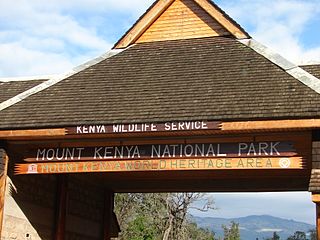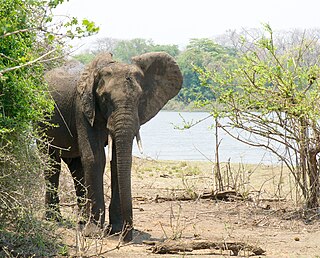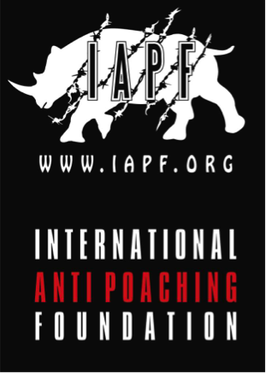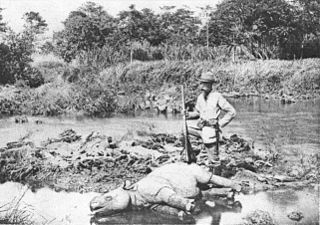
Poaching has been defined as the illegal hunting or capturing of wild animals, usually associated with land use rights. Poaching was once performed by impoverished peasants for subsistence purposes and to supplement meager diets. It was set against the hunting privileges of nobility and territorial rulers.

Garamba National Park is a nearly 2,000-square-mile national park in north-eastern Democratic Republic of the Congo. It is among Africa's oldest parks, and was designated a World Heritage Site by UNESCO in 1980 for its protection of critical habitat for northern white rhinoceroses, elephants, hippopotamuses, and giraffes. Garamba has been managed by African Parks in partnership with the Institut Congolais pour la Conservation de la Nature (ICCN), since 2005.

Way Kambas National Park is a national park covering 1,300 km2 (500 sq mi) in Lampung province, southern Sumatra, Indonesia. It consists of swamp forest and lowland rain forest, mostly of secondary growth as result of extensive logging in the 1960s and 1970s. Despite decreasing populations, the park still has a few critically endangered Sumatran tigers, Sumatran elephants and Sumatran rhinoceroses. It also provides excellent birdwatching, with the rare white-winged wood duck among the over 400 species present in the park.
Liwonde National Park, also known as Liwonde Wildlife Reserve, is a national park in southern Malawi, near the Mozambique border. The park was established in 1973, and has been managed by the nonprofit conservation organization African Parks since August 2015. African Parks built an electric fence around the perimeter of the park to help mitigate human-wildlife conflict. In early 2018, the adjacent Mangochi Forest Reserve was also brought under African Parks' management, almost doubling the size of the protected area.

Kenya Wildlife Service is a state corporation under the Ministry of Tourism and Wildlife established by an act of Parliament; Wildlife Conservation and Management Act CAP 376, of 1989, now repealed and replaced by the Wildlife Conservation and Management Act, 2013. At independence, the Government of Kenya committed itself to conserving wildlife for posterity with all the means at its disposal, including the places animals lived, forests and water catchment areas.

The International Rhino Foundation (IRF) is a Texas-based charity focused on the conservation of the five species of rhinoceros: the White Rhinoceros and Black Rhinoceros in Africa, and the Indian Rhinoceros, Javan Rhinoceros and Sumatran Rhinoceros in Asia.

Majete Wildlife Reserve is a nature reserve in southwestern Malawi, established as a protected area in 1955. The reserve's animal populations were decimated during the late 1970s and 1980s due to poaching and other human activities. Majete has been managed by African Parks since 2003, when the nonprofit conservation organization entered into a public–private partnership with the Malawi Department of National Parks and Wildlife (DNPW). Since then, wildlife has been restored, the park has achieved big five game status, and tourism has increased.

Wildlife Alliance is an international non-profit forest and wildlife conservation organization with current programs in Cambodia. It is headquartered in New York City, with offices in Phnom Penh. The logo of the organization is the Asian elephant, an emblematic species and the namesake for the Southwest Elephant Corridor that Wildlife Alliance saved when it was under intense threat of poaching and habitat destruction in 2001. It is today one of the last remaining unfragmented elephant corridors in Asia. Due to Government rangers' and Wildlife Alliance's intensive anti-poaching efforts, there have been zero elephant killings since 2006. Dr. Suwanna Gauntlett is the Founder and Chief Executive Officer of Wildlife Alliance, and one of the original founders of WildAid. The organization is governed by a board of directors and an international advisory board that provides guidance on strategy, fundraising, and outreach.

The Wildlife Protection Society of India (WPSI) was founded in 1994 by Belinda Wright, its Executive Director, who was an award-winning wildlife photographer and filmmaker till she took up the cause of conservation. From its inception, WPSI's main aim has been to bring a new focus to the daunting task of tackling India's growing wildlife crisis. It does this by providing support and information to government authorities to combat poaching and the escalating illegal wildlife trade - particularly in wild tigers. It has now broadened its focus to deal with human-animal conflicts and provide support for research projects.

The International Elephant Foundation (IEF) is a non-profit 501(c)(3) corporation. Formed by individuals and institutions, IEF is dedicated to the conservation of African and Asian elephants worldwide.

The International Anti-Poaching Foundation (IAPF) is a non-profit organisation registered in Australia, predominantly operating on the African continent. The group initially created a structured military-like approach to conservation, employing tactics and technology generally reserved for the modern-day battlefield, and has since moved to a community oriented approach. This has included the training of local women as rangers.

The SanWild Wildlife Sanctuary is a 5,000 ha (50 km2) wildlife rehabilitation center and reserve in South Africa's Limpopo Province, located a few kilometers south of Leydsdorp, and near the western boundary of the Kruger National Park.

Elephant hunting or elephant poaching and exploitation of the ivory trade are illegal in Chad and pose a major threat to elephant populations. The profitable ivory industry is also a threat to the lives of rangers, even in the national parks, such as Zakouma National Park, the worst-affected area.

TheBlack Mamba Anti-Poaching Unit is the world's first officially-formed, registered and recognised all-female wildlife ranger unit, founded in 2013, with the purpose of protecting wildlife in the regions of the Olifants West Nature Reserve, and the buffer zone in the Greater Kruger of South Africa. The Black Mamba APU was awarded the Champions of the Earth Award, in 2015, by the United Nations Environment Program (UNEP). In the period between 2013 and 2022, the Black Mamba APU has won 10 International awards, for innovative approach to wildlife conservation.

Many species are affected by poaching, including illegal hunting, fishing and capturing of wild animals, and, in a recent usage, the illegal harvesting of wild plant species. The article provides an overview of species currently endangered or impaired by poaching in the Americas, sub-Saharan Africa, and South-East Asia.
Wildlife Angel is a wildlife protection non-governmental organization (NGO) based in Strasbourg (France). Its three main objectives are to protect wildlife, to protect rangers and to fight poaching by intervening in national parks, private reserves and working with other non-governmental organizations (NGO). Wildlife Angel intervenes directly in the field with rangers in charge of animal protection.

Smart Parks is a UK-based charity that specializes in providing aerial surveillance and monitoring services through the use of unnamed aerial vehicles (UAVs), commonly knowns as drones. The organization was founded in 2012 and launched publicly in 2013, and operates as a registered charity in the UK and a private foundation in the Netherlands. The organization was formerly named ShadowView.
Steven R. Galster is an American environmental and human rights investigator and counter-trafficking program designer. Since 1987, he has planned and participated in investigations and remedial programs to stop wildlife and human trafficking and to mitigate corruption and build governance in Asia, Africa, Russia, South America, and the USA.

Rhinoceros poaching in southern Africa is the illegal act of slaughtering rhinoceros in the southern African countries of Namibia, Botswana, Zimbabwe and South Africa, where most of Africa's rhinos occur. The most common reason for rhino poaching is to meet the high demand for their horns in Asian countries, where the horn is predominantly used in Traditional Chinese Medicine but is increasingly being used as a symbol of wealth and prosperity. In previous generations, the most common rhino poaching activity was hunting for recreational purposes. Because of excessive poaching, rhino populations have decline rapidly since the 1970s, leaving some species critically endangered and facing extinction.

Anti-poaching is the organised act to counter the poaching of wildlife. However, it is generally used to describe an overall effort against the illegal wildlife trade. The act of anti-poaching is normally carried out by national parks on public land and by private security companies on privately owned land. Anti-poaching takes many forms and which depends mainly upon the habitat being protected. Typically, it is the act of actively patrolling land in an effort to prevent poachers from reaching the animals.
















